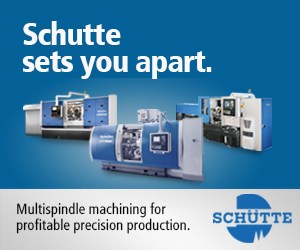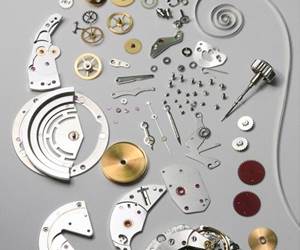Tech College Alum Returns to Teach CAD/CAM at Alma Mater
New part programming developments continue to be added to the Tri-County Technical College curriculum and solutions for Swiss-type lathes might soon be included.
Here, a student learns how to program a CNC to probe cutting tools during machine setup. Source (all photos): CNC Software LLC
A testament to an educational institution is the success of its alumni. Returning to one’s alma mater as a faculty or staff member is especially noteworthy. Such is the case with Gerald Maxie.
“I graduated from what used to be the Machine Tool Technologies program at Tri-County Tech back in 1993, so I’m a product of the college,” says Maxie, instructor of CNC programming and operations in the Advanced Manufacturing program at the Tri-County Technical College. The main campus at the Pendleton, South Carolina, college features 14 buildings which house classrooms, laboratories and machine shops.
After his Tri-County graduation, Maxie worked at several tool and die shops before joining the engineering division of Electrolux Home Products, an appliance manufacturer based in Anderson, South Carolina. In the company’s R&D shop, he worked with engineers to develop products as well as perform CNC machining and programming. Maxie has been in the manufacturing industry for more than 30 years.
“In 2017, after a hiatus from teaching, I became a full-time instructor here at Tri-County and haven’t looked back,” he says. “I’ve enjoyed every minute of it.”
Testing the Teaching Waters
Before he accepted the position at the college, Maxie spent years testing the teaching waters. While at Electrolux, he mentored engineering students from neighboring Clemson University and Georgia Institute of Technology in Atlanta. In 2008, he began teaching part time at Tri-County while working at Electrolux, honing his educator skills in the classroom and on the shop floor. Maxie says he relates to his students because he graduated from the same program that they are now in. Mastercam CAD/CAM software from CNC Software LLC, was and continues to be a major part of Tri-County Tech’s Advanced Manufacturing program.
Gerald Maxie, now instructor of CNC programming and operations at Tri-County Tech’s Advanced Manufacturing program, graduated from that same program in 1993.
“We’ve been using Mastercam since I can remember,” Maxie explains. “I graduated from the program in 1993 and we were using it then. In my opinion, it is one of the most user-friendly CAD/CAM software packages on the market. It fits well with our curriculum.”
Tri-County Tech offers an associate degree in CNC Programming and certificates including CNC Operations and Programming and Introduction to Machining for students who do not wish to pursue the degree. Currently, 45 students are enrolled in the Advanced Manufacturing program. During their first two semesters, students learn manual programming before they are introduced to CAD/CAM. By the fourth and final semester, they are able to produce 2D CAD drawings and complete several CNC machining projects.
“I have some students that are very computer-savvy that just eat it up,” says Maxie of initial reactions to the CAD/CAM software. “It all depends on how comfortable each student is with a computer. Once they get into the software, they usually ask, ‘Why didn’t you show this to us two semesters ago instead of making us handwrite programs?’ I explain that they first need to understand G-code.”
Compared to his days as a tech student in the 1990s, Maxie admits that the current generation grasps technology faster than he and his classmates did. “They pick it up a lot quicker because, nowadays, kids are practically born with cellphones in their hands. They’re not scared of technology,” he says. “Some students are a little hesitant, but the majority pick it up and run with it.”
Tri-County Tech has 50 seats of Mastercam. Its machining facilities house several manual mills, lathes and grinders in addition to 23 CNC machines, including Haas VF-2s, a VF-4, a five-axis UNC-750, several ST-20s, a Swiss-type lathe and fabrication equipment.
“Students start off on manual machines,” Maxie notes. “That’s where we feel that fundamentals develop.” He believes they need to understand the tooling behind it all, such as the aspects of conventional milling, what end mills and drills do and how to operate a lathe.
Second-year students are introduced to CAD/CAM software. For their class project, each individual must create a woodworker’s vise, which mounts under a table. A set of blueprints is provided for each vise part and students then draw the parts as Mastercam solid models. All work is performed in Mastercam, per the project rubric requirement.
Students draw each individual part — including a handle and two vise jaws — as a solid, and then program the parts. Next, they compile a process sheet and determine fixturing. When selecting tool paths, they use everything from 2D Dynamic machining to Contour, Drill and Peel Mill. It takes the class half of a semester to get their parts programmed, machined and working.
The two main stand-up vise jaws are machined from a 4- by 6-inch aluminum billet. The middle rod is an ACME screw thread fabricated to fit the part. Because the vise is not simple to program, Maxie provides encouragement and helps his students ensure programming accuracy.
Online Instruction, Too
In addition to providing in-class instruction, Maxie assigns CamInstructor online software tutorials as supplemental lessons. “I’ll assign them as homework,” he says. “Students can download the home edition. I always say that the only way you’re going to get good at any software program is through set times for working on programming projects.”
CamInstructor offers Mastercam training courses in both online and hybrid formats. Each course includes video instruction, online tests and step-by-step printable instructions covering Mastercam Mill 2D, Mill 3D, Lathe, Solids, Four-Axis, Five-Axis and Wire. CamInstructor’s online courses helped keep CNC programming instruction on track during the COVID-19 pandemic by enabling students to learn remotely. Now, in addition to classroom teaching, tech schools and colleges use online instruction as an effective hybrid learning tool.
The Advanced Manufacturing program’s fifth semester covers 3D surface programming and revolves around an IndyCar project. Each student receives a skeleton wireframe of a race car and uses the 3D Dynamic OptiRough tool path before performing a finishing pass. Maxie encourages his students to experiment with various surface finish tool paths and determine which one yields the best results. The car is machined from a 4- by 8- by 2-inch billet of aluminum.
“We use Dynamic OptiRough high-speed machining on that,” he says. Maxie notes that he appreciates the new radial chip thinning that Mastercam added several versions back. “It allows us to calculate the proper feeds and speeds when we do a smaller stepover and lets us make deeper cuts and smaller stepovers but increases the feed rate for the machine. It typically cuts machining time in half when compared to traditional machining methods.”
In his 30 years of CNC programming and machining, Maxie has witnessed the evolution of machinery and manufacturing software. With software version rollouts, training and troubleshooting, Maxie knows that he can rely on his Mastercam Reseller, Barefoot CNC, when needed. He has visited Barefoot CNC several times for training and refreshers.
“The team helped me understand Dynamic Motion technology and when to use it,” he says. “They are just a great resource. And we’re looking at doing some Swiss turning. Mastercam is developing applications for Swiss, so we plan to have our Barefoot reps come down and do some training.”
The Swiss timing — pun intended — could not be better. One of Tri-County Tech’s newest partners and neighbors is Arthrex Manufacturing Inc. The company manufactures surgical tools, surgical screws, bone splints and other medical devices. The Pendleton location, Arthrex’s fourth U.S.-based manufacturing facility, opened in spring 2019.
“It’s literally across the street from us,” Maxie says of Arthrex. “We were told that the company plans to have 100 Swiss CNC machines in that facility. Also, they use Mastercam for milling, including five-axis work.”
According to Maxie, 90% of Tri-County Tech’s students land full-time employment before they graduate. Well-trained tech grads are in high demand within the region. “I cannot even name all of the machine shops that are in the tri-state area here. The fact that we have so many partners is phenomenal,” he says.
Related Content
Keeping Watch on Small Parts
From watch parts to exotic medical applications, this shop takes on the world of micromachining.
Read MoreTezmaksan CAM Software Streamlines Robotics Programming
RoboCAM is designed to eliminate the complexities of robotics programming, making it accessible to operators of all skill levels.
Read MorePrecision Machining Technology Review: August 2024
Production Machining’s August 2024 technology showcase includes some of the latest technology from SW North America, Tsugami, Siemens, Select Manufacturing Technologies, Hurco and ECI Software Solutions — all on display at IMTS 2024.
Read MoreCAM Software’s Place Serving Emerging Trends
SolidCAM aims to align its product development and customer engagement strategies to address the evolving needs and challenges of the manufacturing industry.
Read MoreRead Next
Do You Have Single Points of Failure?
Plans need to be in place before a catastrophic event occurs.
Read MoreA Tooling Workshop Worth a Visit
Marubeni Citizen-Cincom’s tooling and accessory workshop offers a chance to learn more about ancillary devices that can boost machining efficiency and capability.
Read MoreSeeing Automated Workpiece Measurement in Real Time
User-friendly inspection software for CNC machining centers was shown at IMTS 2024 monitoring measurements between and after machining while performing SPC based on recorded measurement values.
Read More


























